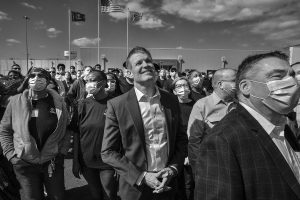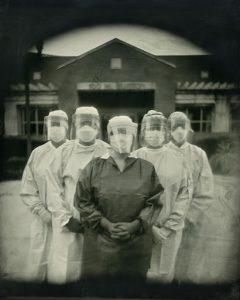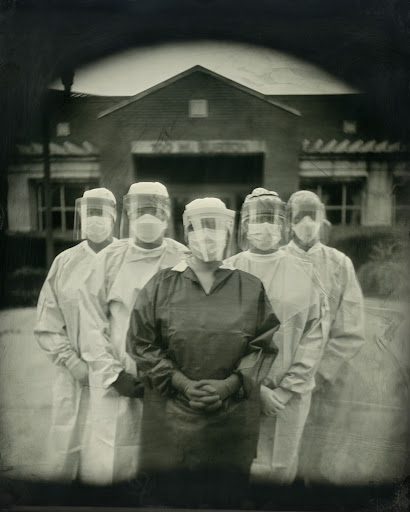The photography exhibit “Nashville: A Pandemic Observed” is on display at the Scarritt Bennett Center in Nashville, TN, through Sept. 30. Curator and photographer Joon Powell, a librarian at the Center and a former news photographer, coped with the isolation of the pandemic by photographing her family’s life at home, ultimately inviting photojournalist friends John Partipilo, Bill Steber and Dawn Majors, who were also documenting the pandemic in their own ways, to collaborate on a show and build community around their work.
Joon, Bill, and John each selected a photograph from the exhibit to share as part of Highlander’s As We Re/Gather project, along with the following thoughts on some of the questions the project is engaging with.
Joon Powell:
Photograph: Umbilical

Artist statement on the photo: The tenuous connections between loved ones are what I was thinking about with my triptych entitled Umbilical. Reading the photos left to right, a person might think of an umbilical cord from birth. My son’s face looks into the lens as if he needs something the garden hose he is climbing could provide. In the second photo, you see a child being guided across a physical boundary with the father’s hand offering sustaining guidance. In the final photo, you see the shadow of my mother’s walker after she broke her hip last year, traversing a boundary in her yard and my shadow taking her picture. The sustenance passing through these connecting threads can be physical, spiritual, or social, and can go not only from mother to child, but child to adult, or adult to adult.
What do we absolutely have to pay attention to right now?
I’ve been struck lately by some folks’ creativity as well as vigilance and the two seem to come hand-in-hand. The drive-by birthday parades are a case in point. My three sisters and I have gathered for a Saturday night zoom every week for more than a year. I’m proud of how we kept that going and were able to buoy each other through this. I think it’s really important to note these successes, however small.
Also, I’ve learned education has many forms and it doesn’t just happen in the classroom and that idea translates to how I view my work as well. My work does not look the way I planned it in January of 2020. Instead it is more meaningful and wider reaching than I had imagined it would be. My children might not adhere to schedules very well, but they have gained some very real life-skills. They can fry an egg, tie their shoes, identify poisonous spiders, and sometimes resolve their own conflicts..
This has been a period of intense grief. How does grief shape our work moving forward?
There has been a huge amount of despair this past year. I have seen it in everyone I know. It can be so hard to not give in to it and feel powerless. Seeing each other’s heartache, and then transitioning into what we’re going to do about it is no easy task. It is certainly part of why I wanted to form this group of photographers: to generate something positive from a period of trauma. I think that one of the successes of our group was that we shared our observations of the world during this time in all of its beauty and its brokenness. The grief we feel and witness has an evolutionary purpose: it reminds us of our connection to each other.
Those tenuous connections are what I was thinking about with my triptych.
John Partipilo:
Photograph: Unmasked.

Artist statement on the photo: The photograph is of [TN] Governor [Bill] Lee at a dedication of a new Tyson chicken plant in Humboldt, TN. Everyone is masked except him. I chose this photograph because it is so much part of the Covid story in Tennessee: A leader who is not setting a good example by not wearing a mask, who is going against science and facts, putting children at risk so he can stay popular with the Trump base for his future political aims. Lots of people are dying because of his decisions and lack of leadership. This is why I selected it.
What did you personally, from your own experience and in your own specific place in the world, observe and see that the rest of us need to understand as we come together in this different way?
As a photojournalist, I was on the front lines of all the Black Lives matters protests, the pandemic, the tornado and the bombing in Nashville. The pandemic and all of this really impacted our city. Many were out of work and there were food shortages. Leadership from our Governor was seriously lacking. He would not issue a mask mandate, he never wore a mask which really sent the wrong message to the electorate. Our Republican legislature plans to have a special session to keep school boards and the health department from issuing mask mandates for children in school that are not vaccinated. They even tried to pass a bill to make it a felony to peacefully protest. It failed. Despite all of this chaos and nonsense I feel that for many it made us stronger and forced people to think out of the box and come up with new ways to solve problems without relying on leadership. This has caused people to stay focused, protect our democracy and keep our faith in facts and science. We have to challenge conspiracy theories and continue to peacefully protest so our voices are heard. Our hospitals’ beds in our city are full of unvaccinated people that have contracted the virus. As more of this happens, more people are starting to change their minds about the facts that they are hearing from their leaders and are getting vaccinated.
In this period, we found ourselves more deeply embedded in solidarity with each other and found that we are our own economy when the state abandons us. What do we need to hold onto as we care for each other moving forward?
I feel we all have to be more self-sufficient and try to solve community problems when government does not. In Nashville, a destructive tornado destroyed many neighborhoods in Davidson County. People lost their jobs and could not work. There was a food shortage even though some organizations were able to feed people. Organizing a community garden on your block and getting neighbors involved on your block. People have to pull together. We are in a time where we have to innovate, adapt and overcome.
Bill Steber:
Photograph: Rutherford County Health Dept., Murfreesboro, TN 2020

Artist statement on the photo: Lashon Miller, center, stands with nursing staff in front of the Rutherford County Health Department in downtown Murfreesboro. “We were tasked with providing the bulk of testing, and then vaccinations for our County, until it became more widely available later on,” says Miller. “Our staff started out very, very small, with about 6 of our nurses, including myself. We eventually hired contract nurses to help us as our operations grew beyond what we could handle on our own. At that point we were working with a staff of around 12-15 nurses depending on some quitting and new ones getting hired.”
I chose this photograph because it is not only honors the hard work and resilience of our public health care workers, but it is also about time itself, linking the history of past pandemics with our own time through the wetplate collodion process from the birth years of photography. After decades of life constantly speeding up in the information age, a year of lockdown and isolation brought the Great Pause. Time often seemed interminably slow, suspended in solution, and then suddenly, weeks, even months were gone in a flash. Time was mutable, elastic, elusive. Now, as the treadmill of life begins its relentless forward motion once again, demanding speed and productivity, it is my hope that we can retain some of the benefits of slowing down, of keeping still, so that our daily experience can momentarily hold itself in a suspended solution and make for each of us those important moments into permanent, if imperfect, images.
What did you personally, from your own experience and in your own specific place in the world, observe and see that the rest of us need to understand as we come together in this different way?
As an individual, the past year and a half has been nothing short of transformational. I’ve longed for an opportunity to step back, slow down, and reassess my priorities, goals and plans for what I want to do and who I want to be for the rest of my remaining time on earth. Obligations to and expectations from others, which I previously felt powerless to push back against, suddenly seemed less important. I began a process of caring for my physical, emotional and creative well-being that would not have happened otherwise. I don’t think my experience is unique in that regard. Underpaid and underappreciated workers at all levels of the economy are dropping out of the system and re-prioritizing their lives. The global shut down has caused millions of people the opportunity, the obligation, to reassess what they want in the future. People are no longer willing to accept aspects of our society that don’t work for them.
As a documentary photographer I continued to spend time photographing family and friends coping with their version of the crisis, as well as the communities of color I’ve been involved with for the past 30 years in the Mississippi Delta. I’ve seen vulnerability mixed with determination, as well as creativity in improvising new ways to survive. I hope that the adaptations we’ve all had to adjust to during this time will carry us forward with renewed resiliency to solve the crises that are ahead.
What solutions/critical transformations are you seeing/experiencing that we have to hang onto and carry into the next season?
As much as the national media focuses on the devolution of the political right in this country into white supremacy, authoritarianism and destabilizing conspiracy mongering, what is less covered is the great awakening happening in the rest of the country. People are aware like never before about the anti-democratic forces aligned to strip vulnerable citizens of their right to vote and the challenges to preserving our institutions in the face of these attacks. The pandemic did not blunt the power of the Black Lives Matter movement over the past year, if anything it gave it more urgency considering the vulnerability of people of color to the threats from the pandemic. Young and old are mobilizing in ways we haven’t seen in generations. Workers are demanding higher wages and better working conditions. The more that cynical state legislatures pass laws designed to silence their political opposition, the effort is emboldening a pushback that will not relent. The stakes are the highest they’ve been in over a generation. The future of the planet and the future of our democracy are both at an inflection point and no one yet knows what the future holds. While the forces of division, extremism and anti-democratic nihilism within the nation have never seemed more threatening in this lifetime, the determination of those who push back against the darkness has also never been stronger.

